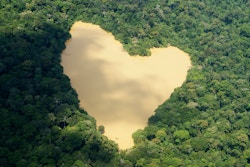The battle for the rainforest begins now
1.1 million km2 of tropical forest, three times the size of Norway, have been lost in twelve years. Meanwhile, all remaining rainforest countries are planning extensive rainforest destruction in the near future. If these plans are not reversed, we may soon lose half of the Amazon rainforest.
2014-09-13
We do not have much time to turn things around
In spite of the unprecedented global attention paid to the issue of deforestation, the destruction of tropical forests continues on a dramatic scale, according to the new report State of the rainforest from Rainforest Foundation Norway and GRID-Arendal.
“Half of the world’s rainforest has been lost since World War 2, and now the rainforest countries are planning further destruction in the years to come. We do not have much time to turn things around. Fortunately, there are some examples that show that it is possible to change our approach”, says Dag Hareide, executive director of Rainforest Foundation Norway.
Download the full report here.
Mafia and organized crime
International organized crime is, according to INTERPOL and the UN programme UNEP, to blame for a large-scale global forest destruction. Between 10 and 30 percent of global deforestation is caused by criminals.
Indonesia, which is already the world’s biggest palm oil producer, intends to double the total area of oil palm plantations in the near future.
The value of global illegal deforestation is estimated to be between 30 and 100 billion USD annually. In comparison, the world’s total development aid is worth approximately 135 billon USD per year.
Organized forest crime is growing rapidly and robs rainforest countries of their natural resources and tax income. In addition, it helps finance terrorist organizations, cartels and militia such as al-Shabaab. Moreover, it undermines development and security, says Christian Nellemann, senior officer in GRID-Arendal’s Rapid Response Unit.
Brazil – the giant that gives us hope
Brazil is the one country that provides us with optimism. As a direct result of political decisions and policing efforts, the largest rainforest country in the world has managed to reduce its rate of deforestation by three quarters compared to the annual average in the period 1996-2005. Measured in carbon dioxide, the reduction is equivalent to Germany’ annual emissions of CO2.
“Brazil demonstrates that it is possible for countries to dramatically reduce the level of deforestation without compromising economic development”, says Hareide.
A large part of Brazil’s deforestation has been caused by soy production and illegal cattle ranching. However, because of political will, policing efforts and legal action taken against the sale of illegally produced soy and meat, Brazil has succeeded in reducing deforestation by 76 percent – whilst maintaining agricultural productivity.
Even in Indonesia, where more rainforest is being lost than in any other country, political attention and incipient policy change represent significant steps forward, something that would have been totally unrealistic a few years ago. In the Democratic Republic of the Congo (DRC), the world’s second largest rainforest country, deforestation rates have been relatively stable, chiefly due to a moratorium on logging concessions.
Political promises and public awareness campaigns are not enough when dealing with the world’s organized criminals.
Oil concessions planned in 75 percent of Peru’s rainforest
The threats against the world’s remaining rainforests are immense. Rainforest countries that on the one hand have expressed a political will to reduce deforestation, are on the other continuing to elaborate plans for major infrastructure development and the expansion of plantations and extractive industries, all of which will increase deforestation.
Almost 75 percent of the Peruvian Amazon is covered by planned or operative oil and gas concessions. Even in Brazil, laws protecting the rainforest and indigenous territories are under pressure. On top of the expected continued expansion of industrial-scale agriculture, the sum total of planned infrastructure and extractive activities are so extensive that they may impact half of the remaining Amazon rainforest.
In Indonesia, which is already the world’s biggest palm oil producer, the government announced in 2009 that it intends to double the production of palm oil to 40 million tons by 2020.
The moratorium on logging concessions in DR Congo has for many years been under pressure, and the expected expansion of roads, mining, plantations and agriculture will lead to a steep increase in deforestation rates.
“These plans will have to be reversed in order for the rainforest to stand a chance. This is the responsibility of states, the business sector and consumers worldwide”, says Hareide.
By strengthening the rights of indigenous peoples, we protect the rainforest.
The report states that we have little control over the big companies and investors profiting from rainforest destruction. These industrial actors are left alone to do whatever they please in their race to meet the market’s need for palm oil, meat, soy, paper and petroleum. This is also the case with regard to Norway’s Government Pension Fund Global, whose investments include 100 billion NOK in industries that contribute to rainforest destruction.
“Political promises and public awareness campaigns are not enough when dealing with the world’s organized criminals”, says Nellemann.
Stop the destroyers, support the guardians
To save the rainforest, we need to do two things: We need to challenge big business and we need to strengthen the local forest communities.
In most places, the rainforest is inhabited by indigenous peoples and forest peoples who for centuries have had the forest as their home. According to our report, the rainforest safeguarded by these communities is protected 6 to 16 times more effectively than areas impacted by so-called modern development.
Around 700 million people globally rely on the rainforest for their livelihood, and most of these do not have formal rights to the land on which they live. These millions of people may at any point be displaced from the forest to the advantage of logging or oil palm plantations.
“By strengthening the rights of indigenous peoples, we protect the rainforest”, says Dag Hareide.
Download the full report here.
